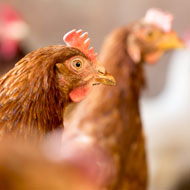Chickens may hold key to protecting humans from viruses

Using GM technology, researchers can boost a chicken's ability to fight disease - and potentially protect people too.
A chicken’s immune system could be better equipped to fight viruses than previously thought, new research suggests.
Through a study of chicken immunology, researchers from The Pirbright Institute have found a previously unknown interferon which they identified as IFN Kappa (IFN-K). The team have now used this new component to better understand how chickens combat viruses.
In the study, researchers created genetically modified chicken embryos which contained a boosted IFN-K molecule. They then tested it against two poultry viruses - Newcastle disease virus and avian influenza H9N2 - which are known to be zoonotic.
The findings, published in Nature Scientific Reports, show that the embryos were better protected. They also suggest that, if a chicken was enhanced with IFN-K, it would be better protected against these viruses - and potentially many more.
Furthermore, the researchers found that IFN-K featured in chicken skin. This indicates its potential to combat poultry viruses that infect the skin - the most notable of which is Marek’s disease.
“The discovery of IFN-K and the information we have been able to gain about its properties and the protection it gives, could offer chickens extra defence against some important diseases,” commented Dr Muhammad Munir, lead author of the study.
“What is especially interesting is that chickens may already possess the key to conquering some of the most dangerous diseases that affect them. Using genetic modification technology we can boost their innate ability to fight disease – potentially protecting people too.”
He concludes: “This study highlights how much more there is to learn from the chicken immune system and could be the first important step towards a major breakthrough in the battle against poultry and human disease.”



 The Animal and Plant Health Agency (APHA) has updated its online reporting service for dead wild birds.
The Animal and Plant Health Agency (APHA) has updated its online reporting service for dead wild birds.